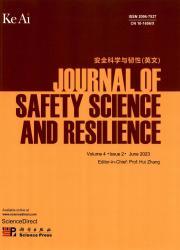Modeling the resilience of startups in the COVID-19 pandemic using the system dynamics approach
IF 3.4
Q1 PUBLIC, ENVIRONMENTAL & OCCUPATIONAL HEALTH
引用次数: 0
Abstract
The COVID-19 pandemic has profoundly impacted startups, disrupting operations, consumer behavior, and market dynamics. Addressing these challenges necessitates an in-depth analysis of startups' vulnerabilities and the development of effective strategies to bolster their resilience and sustainability. This study introduces a combined thematic analysis and system dynamics approach to enhance startups' resilience during the pandemic. A qualitative thematic analysis was employed to identify the key factors influencing resilience. Semi-structured interviews with 12 experts provided data categorized into 21 themes across four dimensions: team, founder, human resources, and startup characteristics. Building on the qualitative phase, a system dynamics model was developed, comprising 32 auxiliary variables, five flow variables, four constants, and four stock variables. Four scenarios were devised to evaluate resilience within this model, reflecting varying degrees of financial strength, government support, and crisis management improvements. The results highlight the effectiveness of Scenario 4, which achieved the highest resilience improvement, driven by a 5 % increase in financial strength, a 5 % increase in government support, and a 10 % enhancement in crisis management. These findings offer critical insights for stakeholders and researchers seeking to strengthen startup resilience during crises.
使用系统动力学方法对COVID-19大流行中初创公司的弹性进行建模
2019冠状病毒病大流行深刻影响了初创企业,扰乱了运营、消费者行为和市场动态。应对这些挑战需要对初创企业的脆弱性进行深入分析,并制定有效的战略来增强其弹性和可持续性。本研究引入了主题分析和系统动力学相结合的方法,以增强创业公司在疫情期间的应变能力。采用定性专题分析来确定影响弹性的关键因素。与12位专家进行的半结构化访谈提供了21个主题的数据,涉及四个维度:团队、创始人、人力资源和初创企业特征。在定性阶段的基础上,建立了包含32个辅助变量、5个流量变量、4个常数变量和4个存量变量的系统动力学模型。设计了四种情景来评估该模型中的复原力,反映了不同程度的财政实力、政府支持和危机管理改进。结果突出了情景4的有效性,在财政实力增加5%、政府支持增加5%和危机管理加强10%的推动下,情景4实现了最大的复原力改善。这些发现为寻求在危机期间加强初创企业弹性的利益相关者和研究人员提供了重要见解。
本文章由计算机程序翻译,如有差异,请以英文原文为准。
求助全文
约1分钟内获得全文
求助全文
来源期刊

安全科学与韧性(英文)
Management Science and Operations Research, Safety, Risk, Reliability and Quality, Safety Research
CiteScore
8.70
自引率
0.00%
发文量
0
审稿时长
72 days
 求助内容:
求助内容: 应助结果提醒方式:
应助结果提醒方式:


